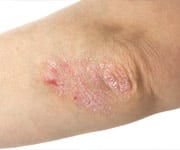Life Extension Magazine®

Adding to accumulating evidence of the beneficial effects of Pycnogenol®, a recent clinical study found that this extract from the bark of French maritime pine trees can significantly and safely improve the symptoms of psoriasis.
This may come as a shock to the majority of American physicians who are frustrated with the current treatment options for psoriasis. But it didn’t surprise Dr. Fred Pescatore. He recommends Pycnogenol® to all patients attending his New York City-based medical practice, which combines a nutritional approach with a complementary medical program. We sat down with Dr. Pescatore, author of The Hamptons Diet and head of the Centers for Integrative and Complementary Medicine in New York, to ask about his use of Pycnogenol® and other supplements in his innovative medical clinic.
LE: What are some of the nutritional supplements you find yourself recommending to your patients, and where do prescription drugs fit into the mix?
FP: My practice is entirely nutritional supplement-based, and therefore I prescribe [a multi-blend formula] consisting of a probiotic, CoQ10, fish oils, vitamin D3, turmeric, polyphenols…the list is very long, but I use all herbals and botanicals in an attempt to cure most patients. I take a holistic approach to meet the needs of patients and provide them with a better understanding of the natural and nutritional steps necessary in maintaining a healthy life. While prescription drugs may have a place in treatment regimen—and I do prescribe them—I believe that some of the most common illnesses or discomforts can be treated without the use of costly medications. All prescription drugs have contraindications and should be thought of as a last resort.
LE: For what type of patient concerns might you recommend Pycnogenol®?
FP: I recommend Pycnogenol® to all of my patients because of its versatility and reach. It’s been proven to help benefit a variety of conditions that range from skin health to heart health and even fitness—all without side effects. Some of the most common applications include improving circulation, maintaining skin health, helping manage blood pressure, menstrual discomfort, and most recently, Pycnogenol® has been shown to help ease inner-ear conditions—the list goes on! Pycnogenol® can be taken without the risk of side effects that I see with prescription drugs.
LE: A recently published study found that Pycnogenol® may help treat psoriasis. Can you briefly summarize the study and findings for our readers?

FP: This clinical trial was conducted over a 12-week period where researchers monitored 73 patients between the ages of 30 and 45 who suffered from moderate to severe psoriasis. All of the patients used standard management practices, and 38 of them supplemented daily with 150 mg of Pycnogenol®. This research showed that supplementation with Pycnogenol® helped reduce inflammation, redness, and the area of skin affected by psoriasis…the extract also helped increase skin hydration. Taking Pycnogenol® reduced the need for costly standard management drugs and the time dedicated to treatment.
LE: Psoriasis is the most prevalent autoimmune disease in the US, affecting almost 8 million people. Can you explain why it has proven so difficult to treat?
FP: Yes, psoriasis affects much more than the appearance and irritation of skin, and unfortunately, standard treatments are often expensive, time-consuming, and may have significant side effects. It can be affected by stress levels and may lead to cardiovascular health risks. Psoriasis causes the immune system to overreact to a perceived threat, which triggers inflammation throughout the body. During this process, blood vessels can become inflamed, which can lead to a buildup of plaque inside the artery walls. Plaque can slow or interrupt the flow of blood to the heart, which heightens the risk of heart disease and heart attack. Because Pycnogenol® is separately recognized for its benefits to heart health and circulation, it is a great, safe, and natural option for those suffering from psoriasis.
LE: Have you successfully treated psoriasis patients with Pycnogenol® therapy?
FP: I have treated many psoriasis patients with Pycnogenol® and I have written about it in my book, The Allergy and Asthma Cure. I had one particularly troublesome patient who had been to every doctor she could think of—allergists, dermatologists, and so on. I placed her on an anti-inflammatory diet, along with 200 mg of Pycnogenol® per day. She was already on a number of my other favorite supplements, so I simply added that. Within two weeks, her skin was clearer and by the end of six months, she couldn’t find one psoriasis patch. Needless to say, she was ecstatic.
LE: Do you take Pycnogenol® and do you believe that everyone should?
FP: Yes, in fact, I call Pycnogenol® one of my “desert island” supplements, meaning that I would not want to be stuck on a desert island without this one. Pycnogenol® can benefit men and women of all ages, and I believe in this supplement so strongly that I recommend it to all of my patients, because it addresses such a variety of common health issues.
LE: Can you give us an example of some drugs that supplements have been able to replace and for what conditions?
FP: Yes, most patients can stop or significantly lower their blood pressure, diabetes, arthritis, asthma, and allergy medications, to name a few. SAMe is great for depression. St. John’s Wort is as good as SSRI’s [antidepressants]. Glucosamine and curcumin [can be taken] in lieu of pain meds. MSM and a formulation of the plant-based enzymes, bromelain and papain, are both good for pain management.
Clinical Study Reports Remarkable Effectiveness Of Pycnogenol® In Psoriasis Patients
 |
Scientists recently published the results of a clinical trial in which the adjunctive effectiveness of Pycnogenol® was tested on psoriasis patients. All 73 patients received standard medical treatment for psoriasis. Only 38 of these participants also received Pycnogenol®.
The standard treatment regime was determined for each patient by his or her dermatologist and included a personalized plan that included some or all of the following: moisturizers, a vitamin D supplement, corticosteroids, light therapy sessions, salicylic acid, and immunosuppressants, among others.
The Pycnogenol® group also received 50 mg of Pycnogenol® supplementation, three times daily.
After 12 weeks, scientists documented impressive improvements in the Pycnogenol® group, which included:1,2
- 20% decrease in the area of skin affected by psoriasis in all body regions, compared to an 8% decrease with standard treatment,
- 44% reduction in redness, compared to a 28% reduction with standard treatment,
- 45% decrease in skin hardening, compared to a 21% decrease with standard treatment,
- 45% less flaking on the body area affected by psoriasis, compared to 16% less flaking with standard treatment,
- 32% improvement in treatment time and a 34.6% reduction in treatment costs, compared to standard treatment,
- Significant increase in content of water and oil/lipids in all areas of the skin, compared to standard treatment,
- Significant reduction in the need of standard psoriasis management drugs,
- Significant decrease in oxidative stress (which plays a role in psoriasis as a possible marker of active inflammation), compared to standard treatment.
After the 12-week trial, 80% of the Pycnogenol® group decided to continue using the extract, a good indicator of their emotional reward.2
Lead study researcher, Dr. Gianni Belcaro, said that, “As a natural nuclear factor-kappa beta (NF-kb) inhibitor, Pycnogenol® reduces inflammation at the onset and can act as a natural, vegetal ingredient to control inflammation, swelling, and oxidative stress.2
“In this study and in several others on chronic inflammatory conditions,” said Belcaro, “Pycnogenol® has shown significant clinical results and without any side effects, making it a safe, natural, alternative for those seeking relief from the symptoms of psoriasis.”2
LE: Do you sometimes recommend therapies beyond drugs and supplements—a special diet for instance?
FP: Every patient gets an exercise prescription formulated for their specific condition. I actually employ trainers in my office who are specialized in medical exercise. Each patient is put on a specific diet according to their food sensitivities. And of course, meditation, acupuncture, cleanses, and detoxes are all utilized, depending on the situation. My practice embraces all healing modalities.
LE: Do you offer general dietary advice for your patients that you could share with our readers?
FP: The fewer the carbs, the better. Carbs should basically come from vegetables and legumes—not grain. Cholesterol [as a taboo] is a myth—eat healthy fats. Monounsaturated from olives, macadamia nuts, and avocado. Eat polyunsaturated fats from fish only. Lean protein from organic animals is best. No farm-raised fish. And drink half your body weight in ounces of water per day.
LE: Thank you, Dr. Pescatore.
For more information on Dr. Fred Pescatore and his medical practice, or how to purchase his published books, visit http://www.drpescatore.com.
If you have any questions on the scientific content of this article, please call a Life Extension® Health Advisor at 1-866-864-3027.
References
Belcaro G, Luzzi R, Hu S, et al. Improvement in signs and symptoms in psoriasis patients with Pycnogenol® supplementation. Panminerva Med. 2014 Mar;56(1):41-8.
Available at: http://www.pycnogenol.com/home/detail/study-finds-natural-extract-pycnogenol%c2%ae-to-improve-psoriasis-symptoms-including-redness-skin-hardening-and-flaking. Accessed October 15, 2014.

